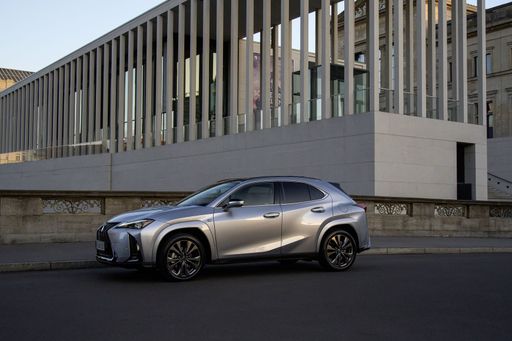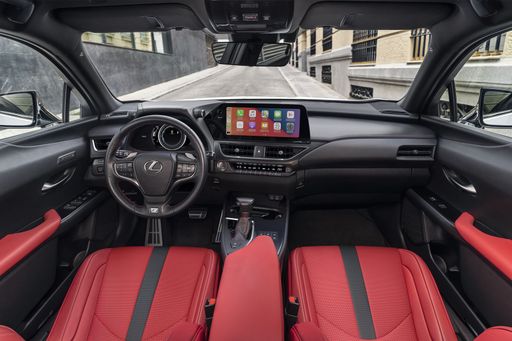Hyundai Kona vs Lexus UX - Differences and prices compared
Compare performance (218 HP vs 199 HP), boot space and price (23100 £ vs 37900 £ ) at a glance. Find out which car is the better choice for you – Hyundai Kona or Lexus UX?
Costs and Efficiency:
Price and efficiency are often the first things buyers look at. Here it becomes clear which model has the long-term edge – whether at the pump, the plug, or in purchase price.
Hyundai Kona has a clearly advantage in terms of price – it starts at 23100 £ , while the Lexus UX costs 37900 £ . That’s a price difference of around 14871 £.
Fuel consumption also shows a difference: Hyundai Kona manages with 4.60 L and is therefore barely noticeable more efficient than the Lexus UX with 5 L. The difference is about 0.40 L per 100 km.
Engine and Performance:
Power, torque and acceleration are the classic benchmarks for car enthusiasts – and here, some clear differences start to show.
When it comes to engine power, the Hyundai Kona has a barely noticeable edge – offering 218 HP compared to 199 HP. That’s roughly 19 HP more horsepower.
In acceleration from 0 to 100 km/h, the Hyundai Kona is barely noticeable quicker – completing the sprint in 7.80 s, while the Lexus UX takes 7.90 s. That’s about 0.10 s faster.
In terms of top speed, the Hyundai Kona performs a bit better – reaching 210 km/h, while the Lexus UX tops out at 177 km/h. The difference is around 33 km/h.
Space and Everyday Use:
Cabin size, boot volume and payload all play a role in everyday practicality. Here, comfort and flexibility make the difference.
Both vehicles offer seating for 5 people.
In curb weight, Hyundai Kona is barely noticeable lighter – 1370 kg compared to 1495 kg. The difference is around 125 kg.
In terms of boot space, the Hyundai Kona offers distinct more room – 466 L compared to 320 L. That’s a difference of about 146 L.
In maximum load capacity, the Hyundai Kona performs hardly perceptible better – up to 1300 L, which is about 69 L more than the Lexus UX.
When it comes to payload, Lexus UX evident takes the win – 615 kg compared to 490 kg. That’s a difference of about 125 kg.
Who wins the race in the data check?
The Hyundai Kona is decisively ahead in the objective data comparison.
This result only shows which model scores more points on paper – not which of the two cars feels right for you.
Costs and Consumption
View detailed analysis
Engine and Performance
View detailed analysis
Dimensions and Body
View detailed analysis

Hyundai Kona
Hyundai Kona
The Hyundai Kona wears its personality on the outside with bold styling and sprightly handling that turns city driving into something a little more fun than a commute. It blends practical space, modern tech and sensible running costs into a compact, stylish package — a smart pick if you want flair without paying luxury prices.
details



Lexus UX
The Lexus UX is a compact luxury crossover that blends sharp styling with a quiet, comfortable cabin, perfect for urban buyers who want premium feel without shouting about it. It rides with poise, serves up plush materials and thoughtful tech, and—while it won’t satisfy anyone chasing track thrills—it's a smart, stylish choice for everyday driving.
details



Costs and Consumption |
|
|---|---|
|
Price
23100 - 41600 £
|
Price
37900 - 54100 £
|
|
Consumption L/100km
4.6 - 7 L
|
Consumption L/100km
5 - 5.6 L
|
|
Consumption kWh/100km
14.6 - 16.8 kWh
|
Consumption kWh/100km
-
|
|
Electric Range
377 - 514 km
|
Electric Range
-
|
|
Battery Capacity
1.3 - 65.4 kWh
|
Battery Capacity
-
|
|
co2
0 - 163 g/km
|
co2
113 - 127 g/km
|
|
Fuel tank capacity
38 - 47 L
|
Fuel tank capacity
43 L
|
Dimensions and Body |
|
|---|---|
|
Body Type
SUV
|
Body Type
SUV
|
|
Seats
5
|
Seats
5
|
|
Doors
5
|
Doors
5
|
|
Curb weight
1370 - 1773 kg
|
Curb weight
1495 - 1555 kg
|
|
Trunk capacity
466 L
|
Trunk capacity
283 - 320 L
|
|
Length
4350 - 4385 mm
|
Length
4495 mm
|
|
Width
1825 mm
|
Width
1840 mm
|
|
Height
1580 - 1585 mm
|
Height
1540 mm
|
|
Max trunk capacity
1300 L
|
Max trunk capacity
1194 - 1231 L
|
|
Payload
420 - 490 kg
|
Payload
555 - 615 kg
|
Engine and Performance |
|
|---|---|
|
Engine Type
Electric, Petrol, Full Hybrid
|
Engine Type
Full Hybrid
|
|
Transmission
Automatic, Manuel
|
Transmission
Automatic
|
|
Transmission Detail
Reduction Gearbox, Manual Gearbox, Dual-Clutch Automatic
|
Transmission Detail
CVT
|
|
Drive Type
Front-Wheel Drive, All-Wheel Drive
|
Drive Type
Front-Wheel Drive, All-Wheel Drive
|
|
Power HP
115 - 218 HP
|
Power HP
199 HP
|
|
Acceleration 0-100km/h
7.8 - 11.9 s
|
Acceleration 0-100km/h
7.9 - 8.1 s
|
|
Max Speed
162 - 210 km/h
|
Max Speed
177 km/h
|
|
Torque
200 - 265 Nm
|
Torque
-
|
|
Number of Cylinders
3 - 4
|
Number of Cylinders
4
|
|
Power kW
85 - 160 kW
|
Power kW
146 kW
|
|
Engine capacity
998 - 1598 cm3
|
Engine capacity
1987 cm3
|
General |
|
|---|---|
|
Model Year
2024 - 2025
|
Model Year
2025
|
|
CO2 Efficiency Class
A, D, C, E, F
|
CO2 Efficiency Class
C, D
|
|
Brand
Hyundai
|
Brand
Lexus
|
Is the Hyundai Kona offered with different drivetrains?
Available configurations include Front-Wheel Drive or All-Wheel Drive.




